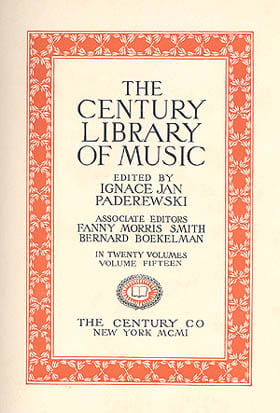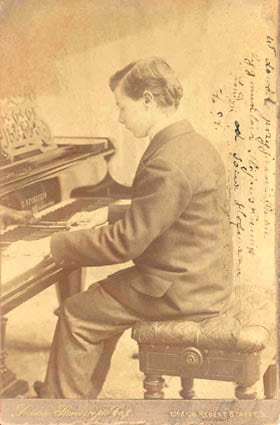by Josef Hofmann [1]
During one of my visits to New York I went to hear “Cavalleria Rusticana” at the Metropolitan Opera House. In the box adjoining mine I observed some little children who were weeping pitifully over the fate of Santuzza. I drew the attention of one of the ladies in my part to this unexpected picture. She protested that no child could possibly feel the emotion of the plot of this opera. This theory I contradict. Those children were exited and distressed, “worked up” either by pleasure or pain into a state of hysteria. You certainly would not see any such picture in Europe, where the feelings of children are more carefully guarded.

The very different plan on which my own early education was conducted came forcibly to my mind. Music has always been a part of me. Playing the piano is now my second existence. My ear taught me to pick out any melody that I heard when I was but three years old; at four I could improvise simple accompaniments for my friends who sang. But when [I was] a very young child my father was extremely careful not to allow me to work too hard at music.[2] He was a wise, kind father, and knew that too swift development of the brain will mar the physical development of any child. While he encouraged me in my musical ambition, he carefully guarded me from contact with deep and classical works. He was then conductor of the opera at Warsaw; but I was permitted to listen only to the brighter and simpler compositions of Haydn, Mozart, and Beethoven. If this plan were followed in the musical education of children, it could not fail to operate to their advantage.
My regular lessons began when I was four years old, and occupied from twenty minutes to half an hour each day. I was eight years old when I gave a concert in Warsaw, at which I played chiefly Beethoven’s sonatas. My first set of these sonatas was the gift of Madame Modjeska, who was one of the first of the great artists to take a personal interest in my talent and my future. As she was then very prominent in all the great capitals of the world, she did much toward exploiting my name before my début.[3]
Shortly after the concert at Warsaw I was taken on a tour through all the principal cities of Poland and Germany, where I attracted the attention of the public and of the musical world. My meeting with the late Mr. Abbey marked the beginning of the most glorious times of my boyish career. He engaged me for America, where I came when I was eleven years old. It was then that I first tasted consciousness of my power. In New York my father once took me to see the people waiting for hours before a concert, eager to purchase the few seats that were left from the advance sale.[4] Child as I was, I remember the exquisite thrill that went through me as I realized that all this excitement and commotion was caused by my art. I can never forget the delight, I may almost say rapture, that came tome in the presence of those vast audiences. I remember, too, all the little themes that were suggested to me to improvise upon by the people whom I saw in the hall.

It was the greatest fortune of my life to pass from the concert stage into earnest and quiet study as Rubinstein’s pupil.[6] He had very few pupils. His antipathy to teaching was natural, for the amount of life and soul that he threw into it sapped his strength. He forgot himself in his enthusiasm. Very often my stipulated hour’s lesson would stretch into many, for if he became interested in his work he forgot his meals, his engagements, everything except the instrument before him and the ideas which he was transferring from his own brain to that of his student. I do not believe in incessant practice—I seldom practise more than two hours a day. I did not even when engaged in my studies with Rubinstein. He did not believe in continuous practice for me. The training of my childhood had already given my fingers such flexibility and strength that I could grasp technically almost any composition at first sight. Rubinstein of ten asked me the question: “Do you know the difference between piano-playing and piano-reciting?” and answered it himself, saying, “Piano-playing is the movement of the fingers, piano-reciting is the movement of the soul.”
Under the influence of Rubinstein, I was made to feel myself less an individual genius than a mere medium for the interpretation of the works of the masters. He always insisted that the first duty of the artist was to smother self; that his personality should never be inflicted upon his listeners, who are before him to hear and feel, and nothing else. He sternly forbade any such movements as throwing back the head, or dreamful swaying of the body, or gymnastics with the arms. “These things,” he said, “may make money and excite the worship of the foolish, but they do not become the real artist and great musician. Work toward your ideals only, young man, and success must surely come.” There was a time, however, when I could not help thinking of myself, a weakness which caused a case of what we call stage fright. I went straight to Rubinstein. Many students, chiefly young girls, had followed him from Russia, in the hope of finding the opportunity of occasionally playing before him. My own lessons were frequently attended by an audience of these students. Rubinstein’s influence, and these lessons before an audience, had once taught me absolute unconsciousness of myself, and now restored the repose of self-unconsciousness which had been mine as a child— a mental condition which was afterward of inestimable advantage when playing before perhaps the greatest audiences ever assembled.

Notes
[1]. This article was originally published in Ignacy Jan Paderewski, Fanny Morris Smith and Bernard Boekelman, eds., The Century Library of Music vol. 15 (New York: The Century Co., 1902), 509-512. The article belongs to a series on “The Methods of the Masters of Piano-Teaching in Europe.” According to the New Grove Dictionary of Music II (Online), Józef Kazimierz Hofmann (born in Kraków, 20 January 1876; died in Los Angeles, 16 February 1957) was an American pianist of Polish birth, son of opera conductor Kazimierz Hofmann and singer Matylda. Hoffman was “one of the most precocious musical prodigies in history, and equally gifted in mathematics, science and mechanics.” After repeated world concert tours (with the period 1910-1935 considered his most successful), he became director of the Curtis Institute of Music in Philadelphia, giving his final concert in 1946. [Back]
[2]. Kazimierz Hofmann (born in Kraków, 1842; died in Berlin, 6 July 1911) was a Polish pianist, conductor and teacher who studied in Vienna, worked in Kraków and Warsaw, and moved to Berlin in 1886 to take care of his son’s education and career. [Back]
[3]. Madame Modjeska, or Helena Modrzejewska (birth name: Jadwiga Helena Misel, married name: Countess Chłapowska; 1840-1909), was a Polish actress famous for her Shakespearean roles (17 different characters). After a career in Kraków and Warsaw, in 1876 moved to California where she settled on an “utopian” farm, Arden. In 1877 started performing in English; she toured the U.S. 26 times and in 1883 became an American citizen. Modjeska’s acting abilities included music (singing, piano), and she was also a mentor and supporter of Ignacy Jan Paderewski. Encounters with both pianists are described in her memoirs. See Maja Trochimczyk, “How Paderewski Plays’: Chant d’amour, and the Aestheticism of the Gilded Age,” paper read at the 2002 Annual Meeting of the American Musicological Society. [Back]
[4]. According to the entry in New Grove Dictionary of Music and Musicians by Gregor Benkor, Hofmann was seven at the time of his European début. His American début welcomed with an incredible enthusiasm by the public, took place on 29 November 1887 at the Metropolitan Opera House in New York. [Back]
[5]. The photograph was made by London Stereoscopic Co., Regent Street, W. The inscription is in Polish and reads: W dowód przyjaźni Panu Zygmuntowi Stojowskiemu od Józia Hofmann. 2/6 94″ [As a proof of friendship to Mr. Zygmunt Stojowski, from Joe Hofmann, 2 June 1894]. Note that Hofmann uses the Polish diminutive of his first name, “Józef – Józio.” [Back]
[6]. Between 1892-1894 Hofmann studied with Anton Rubinstein, being his only pupil. He began concertizing again only after his mentor’s death. [Back]
Józef Kazimierz Hofmann (born in Kraków, 20 January 1876; died in Los Angeles, 16 February 1957) was an American pianist of Polish birth, son of a Polish opera conductor Kazimierz Hofmann and a singer, Matylda. According to the New Grove Dictionary of Music and Musicians Online, Hoffman was “one of the most precocious musical prodigies in history, and equally gifted in mathematics, science and mechanics.” After repeated world concert tours (with the period 1910-1935 considered his most successful), he became director of the Curtis Institute of Music in Philadelphia, giving his final concerts in 1946. The essay reprinted here is not listed in his bibliographies.